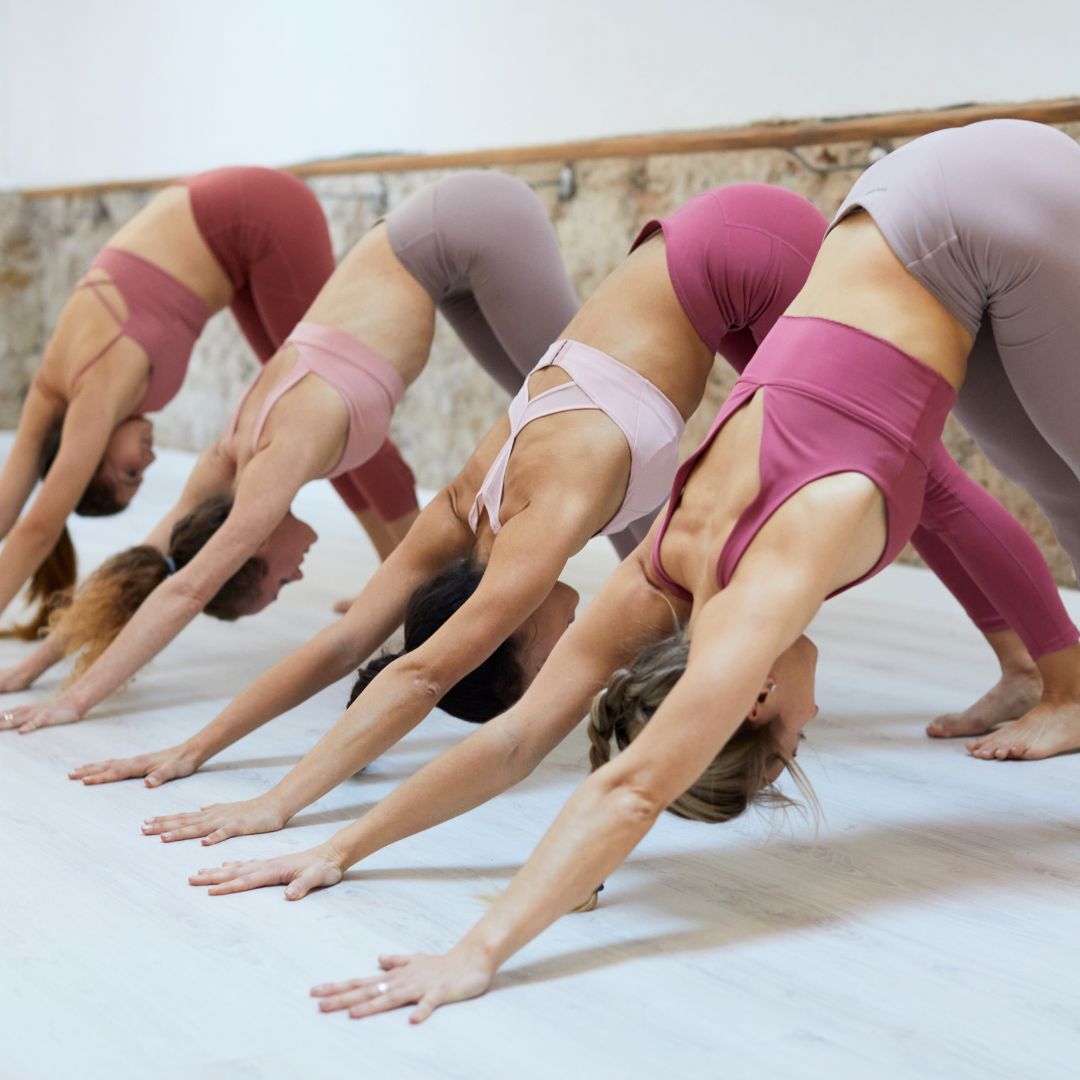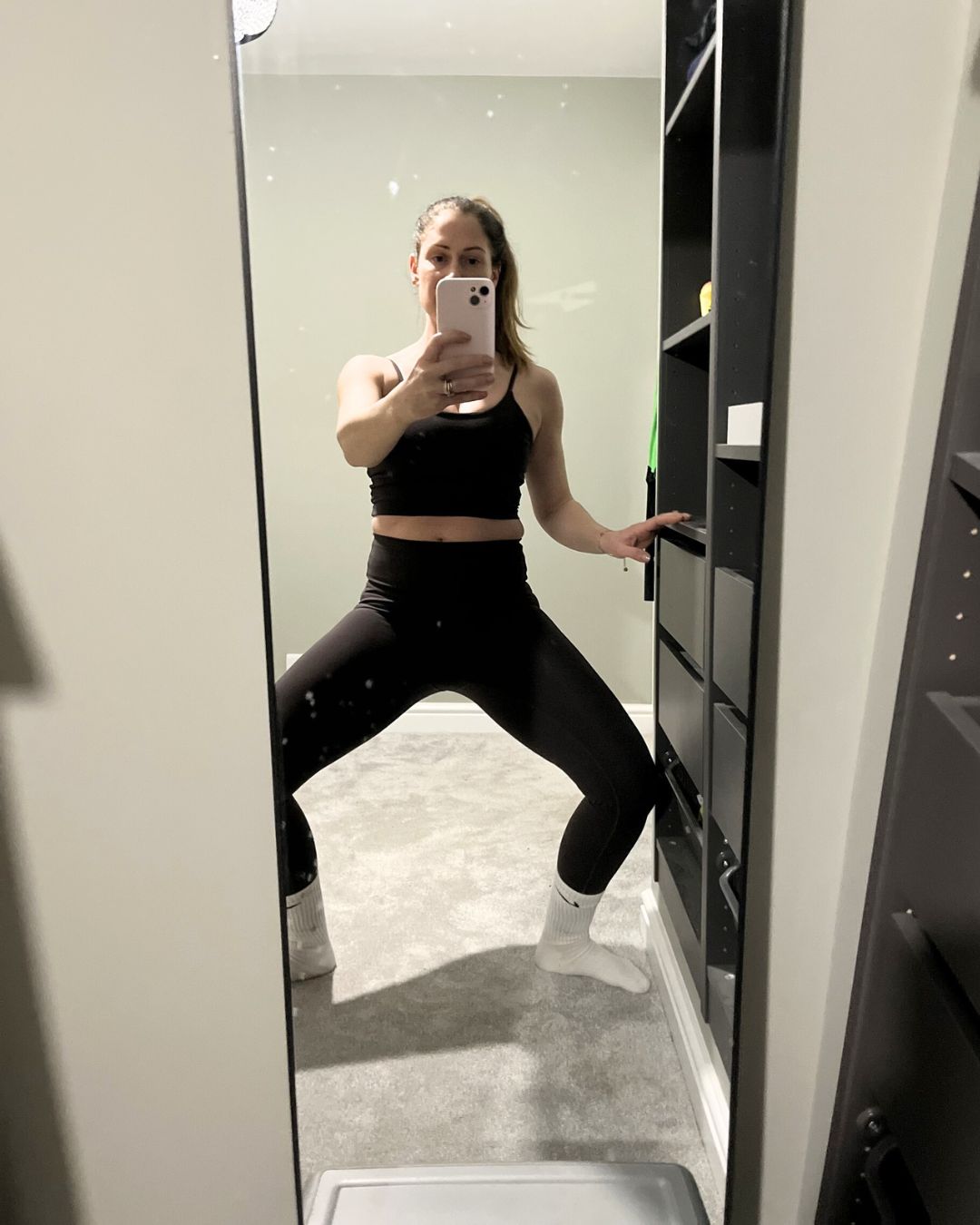
Maybe it’s the colder weather or perhaps it’s my hormones, but recently my trusty high-impact, cardio-heavy workouts just haven’t been giving me the endorphin buzz they used to, leaving me more lacklustre than energised. Whereas previously I could rely on a quick HIIT workout at home to blow away any cobwebs (both mental and physical), lately I just haven’t been feeling it. Enter stage right, Ballet barre for home.
I'm someone who is naturally highly strung, so was interested to learn that my high-octane exercise regime wasn’t doing me any favours – studies, including this 2021 paper, show that while HIIT can indeed benefit mental health, too much of a good thing can overstress your body, dampening metabolism and increasing stress markers such as cortisol levels.
With this in mind, I’ve had to search for my exercise highs elsewhere. Interestingly, I found them in the most unlikely of places: the ballet studio. Don’t get me wrong – I thought I’d hung up my legwarmers and ballet shoes many years ago – but Barre has fast become my favourite way to work up a sweat.
There are many benefits of Barre- it's low impact, seriously effective, and fun, too - and the more I've enjoyed my new workout, the more I've found that I’m not alone. Google searches for home barre classes are soaring, with lots of us channelling our inner prima ballerina in our quest for an accessible, challenging workout without a burpee in sight.
You might have guessed by now that I'm a fan, but if you'd like to see how I got on trying it for a month, keep scrolling. Spoiler alert: I won’t be going back to full-time HIIT anytime soon... Don't miss our guides to Barre classes and Barre exercises, while you're here.
I tried Ballet Barre for home for a month - here's how I got on
What is Barre?
“Barre is essentially a fusion of ballet, Pilates and more traditional strength training exercises,” explains Barre expert and founder of online Barre platform Meet you at the Barre, Jen Brown. “Each instructor adapts it to suit their personal style, meaning Barre takes many different forms. However, all classes focus on small, pulsing movements with emphasis on form, alignment and core engagement.”
You’ll be pleased to know there’s no need to don your leg warmers or leotard, either – Barre doesn’t require any specialist equipment other than some kind of hip-height object which you can use for balance (think the back of a chair or another piece of sturdy furniture).
@katecookfit ♬ Stuck In The Middle - Tai Verdes
When was Barre invented?
Despite a recent surge in popularity, Barre itself isn’t a new practice, dating back to the 1960s.
“The origins of Barre are unclear, but experts agree that Lotte Berk, a former ballet dancer, founded the movement in the early ‘60’s,” says Brown. “Having injured her back, Berk decided to combine her rehab exercises with ballet and the practice we now know as barre was born.”
What are the benefits of Barre?
1. It's accessible
Although Barre may conjure up images of limber and graceful dance professionals, it's actually super accessible, no matter what your fitness level is. If you’re concerned you’re not a natural on the dancefloor, don’t let that put you off - trust me when I say I have zero coordination or skill in the dance department.
I started off as a total beginner, having hung up my ballet shoes at the tender age of nine, but I quickly got to grips with the moves – and you’ll likely recognise many of them from other strength training disciplines.
2. It's a full-body workout
Barre combines cardio, strength, and functional fitness movements for a full-service workout that ticks all my boxes – but be warned – it’s not easy.
Bearing in mind I’m a fitness writer, I consider myself to be pretty active. But nothing prepared me for the infamous Barre burn (full disclosure, I had DOMS for days after I first started). Even a few months into my practice, I’m targeting what feels like all my muscles and it is hard.
“You’ll never forget your first barre class,” agrees Brown. “As a beginner, the burn you experience will be unlike any other exercise class you’ve taken. The small movements take each muscle group to fatigue, which results in the infamous ‘barre-shake’.”
My advice? Embrace the shake – even the experts experience it – and it doesn’t mean you’re doing it wrong.
@sierra_joost ♬ Cruel Summer - Taylor Swift
3. It’s great for our mental health
Brown is evangelical about the mind and body benefits of Barre, telling Marie Claire UK: “A kind of alchemy occurs in the classes - the mental health benefits are enormous."
How? She reckons the feel-good music, the mindfulness (you have to really concentrate on the ever-changing moves) and the endorphin rush combine to result in something far greater than the sum of its parts.
4. It’s time-efficient
One of the main reasons I got so into HIIT was that it was so easy to fit into my over-stuffed schedule, no matter how little time I had. And Barre is similar – you really don’t have to sweat it out for an hour to see and feel the benefits. And what’s more – you’ll notice the benefits when you’re least expecting it. Sprinting up the stairs is easier, I’m noticeably stronger, and I’m pretty sure I’m running faster, too.
5. It helps our bodies age better
“Barre will vastly improve posture, balance, strength and flexibility,” notes Brown. “As we get older, we start to lose oestrogen and our bodies begin to be more susceptible to injury, aches and pains. Crucially, classes are low-impact (no jumping) but high intensity (so women still get the results they want), and also don’t trigger the stress response of more traditional high-impact workouts, making the classes both nourishing and sustaining.”
Tempted to give it a go? There’s a whole range of classes available online (thanks, lockdown) so it’s easy to find one that suits, with many offering free trial periods.
Who knows? Barre might just be your new favourite workout – you can thank us later.
How I got on swapping HIIT for Barre
Week one
As a long-time Pilates workout and strength-training fan, I was pretty confident I’d enjoy ballet Barre, but that’s not to say that I found the classes easy from the get-go.
For my first week, I chose beginner-level full-body classes from Brown’s online community Meet You at the Barre. They handily offer a four-week basics class schedule so you can be sure you’re nailing the moves – and, more importantly, your form – before progressing.
Full disclaimer alert: I struggled. I’m never usually one to take the modifications in a class but for the first couple of weeks, I had no choice but to set my ego well and truly aside. I was forced to lower my heels and straighten my legs out of my deep second-position plies on more than one occasion when my thighs were on fire.
As a runner and spinning aficionado, it’s an understatement to say that my hip flexors are always tight, so I found the near-constant external rotation needed for the plies and ronds de jambe (drawing a semi-circle with pointed toes) challenging.
Undeterred, I hopped back into the moves as soon as I could and by the end of the second week, I was surprised to feel my hips loosening slightly – something a lifetime of foam-rolling and pigeon poses hasn’t achieved.
Week two
Once I’d mastered the basics, I concentrated on improving my balance – which, it’s fair to say, was pretty poor at the outset.
That said, a 12-year study published in the British Journal of Sports Medicine has shown the ability to stand on one leg is a strong marker of longevity and overall health, so I knew it was worth persevering, and as my posture improved and my core felt stronger each week, so too my wobbles diminished.

Week three
By now, I was well and truly into the swing of things and extended my practice to more frequent, longer classes. I loved the classes so much that I found it easy and enjoyable to move my body at least four times a week, plus squeeze in a non-negotiable run or cycle habit, meaning I was crushing my NHS-recommended two strength workouts per week.
However, rest is also an important part of any fitness regime, so I always made sure I interspersed my training with recovery days. Helpfully, Brown has a selection of delightfully-named "Barre snacks" for days when you’re short on time, motivation, or all of the above.
Week four
By week four, I practically had to stop myself from logging on every day to practice. I’m obsessed with my new routine and really enjoying it – and I’m not alone, as the rise in Google search shows.
That said, I’m still finding the workout challenging – something Brown reassures me is entirely normal. “Barre, like yoga, is a practice, so it doesn’t get easier, you just get better and stronger with each class,” she says.
So, will I continue with my practice? Absolutely. It’s safe to say I’m a convert and could wax lyrical about Barre benefits for days – but you’ll have to try it for yourself and see.
Shop our go-to fit kit now:
The Bala ankle and wrist weights went viral for a reason. Not only do they look great, but they help take your workout up a notch by adding extra weight.
Topping our guide to the best yoga mats is this super popular 5mm-thick mat that comes with a whole load of cushioning, visual alignment cues and moisture absorption. Put it this way: it’s a deliciously padded mat that you won't mind getting out of bed for.







